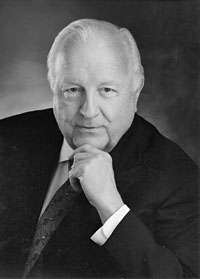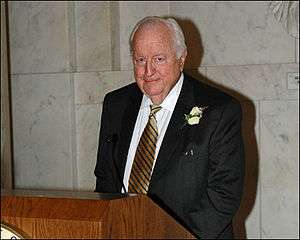Leonidas Ralph Mecham
| Leonidas Ralph Mecham | |
|---|---|
 | |
| Director of the Administrative Office of the United States Courts | |
|
In office July 15, 1985 – May, 2006 | |
| Appointed by | Warren Burger |
| Succeeded by | James C. Duff |
Leonidas Ralph Mecham (born April 23, 1928, in Murray, Utah[1]) is the former Director of the Administrative Office of the United States Courts, having served in that position from 1985 to 2006. He was appointed to the position by United States Chief Justice Warren Burger in July 1985.[1]
Biography
Ralph Mecham was born April 23, 1928, in Murray, Utah. He obtained his B.S. degree in political science from the University of Utah (1951); a Juris Doctor degree from George Washington University (1963), and a master's degree (in public administration) from Harvard University.[1][2][3]
His initial government position was as a legislative assistant and administrative assistant to U.S. Senator Wallace F. Bennett, eventually becoming the Senator's chief of staff.[2] After that, he served as vice president of, and taught constitutional law at, the University of Utah. He returned to Washington, resuming government service as a special assistant to the United States Secretary of Commerce. He was named head of the Administrative Office on July 15, 1985.[4]

Mecham was the longest-serving Director of the Administrative Office, retiring after more than 20 years in April 2006.[1][5] One of the principles that Mecham spearheaded during his lengthy tenure was court budget and management decentralization,[6] permitting individual courts to set their own local policies and spending priorities within broad national guidelines.
Mecham's official papers are now housed at the University of Utah Marriott Library.[5]
Personal life
Mecham is married (wife Barbara) and has 5 children and 14 grandchildren.[1] He is a Mormon.[2]
Controversies
In 2001, during his tenure as Director of the Administrative Office, the AO began monitoring the Internet communications of the judicial branch.[7] Led by Ninth Circuit Judge Alex Kozinski,[8] the Federal Judges Association, which represents about 85% of U.S. federal judges, adopted a resolution opposing the monitoring. Mecham accused Kozinski of having a "great interest in keeping pornography available to judges," saying that Kozinski was "advocating his passionate views that judges are free, undetected, to download pornography and Napster music on government computers in federal court buildings on government time even though some of the downloading may constitute felonies."[9]
Seven years later, on November 24, 2008, Mecham filed a formal ethics complaint in the Court of Appeals for the Third Circuit in Philadelphia against now-Chief Judge Kozinski and two other judges, for their acts disabling the monitor.[10][11][12]
References
- 1 2 3 4 5 Statement of Sen. Hatch, Retirement of Leonidas Ralph Mecham, Cong. Record., May 19, 2006, p. S4794
- 1 2 3 Statement of Rep. John Conyers, Jr., Committee on the Judiciary, U.S. House of Representatives, March 15, 2006
- ↑ University of Utah Distinguished Alumni
- ↑ Director Mecham Marks Tenth Anniversary at AO, The Third Branch (newsletter of the U.S. Federal Courts), June 1995
- 1 2 Leonidas Ralph Mecham Papers (1949-2006), University of Utah Marriott Library Special Collections
- ↑ "Mother May I" No Longer in Courts' Vocabulary, The Third Branch (newsletter of the U.S. Federal Courts), February 2004
- ↑ Fed Court Staffs to Be Monitored, Wired, September 19, 2001
- ↑ Alex Kozinski, Privacy on Trial: Big Brother is watching you, your honor, The Wall Street Journal, September 4, 2008
- ↑ Plan for Web Monitoring in Courts Dropped, New York Times, September 9, 2001
- ↑ Ex-Court Exec Files Ethics Complaint Claiming Kozinski Disabled Anti-Porn Software, American Bar Association Journal, Nov. 26, 2008.
- ↑ Retired U.S. Court Executive Files Kozinski Complaint, Cynthia Cotts, Bloomberg News, Nov. 25, 2008
- ↑ Another Shot Fired in Alex Kozinski Ethics Investigation, Nathan Koppel, Wall Street News Law Blog, Nov. 28, 2008
External links
- Leonidas Ralph Mecham Papers (1949-2006), University of Utah Marriott Library Special Collections
- House. Res. 724, 109th Cong., March 14, 2006, Honoring Leonidas Ralph Mecham, Director of the Administrative Office of the United States Courts and Secretary of the Judicial Conference of the United States.
- Judicial Conference Recognizes Director’s Service to Judiciary, The Third Branch (newsletter of the U.S. Federal Courts), March 2006
- Director Mecham Marks Tenth Anniversary at AO, The Third Branch (newsletter of the U.S. Federal Courts), June 1995
- Judicial Conference resolution honoring Mecham, March 14, 2006
- Kenneth A. Wittenberg & Jill Schneider, Monitoring Internet use at work, Oregon State Bar Bulletin, January 2002, includes a detailed discussion of the issue of the Administrative Office's Internet monitoring.